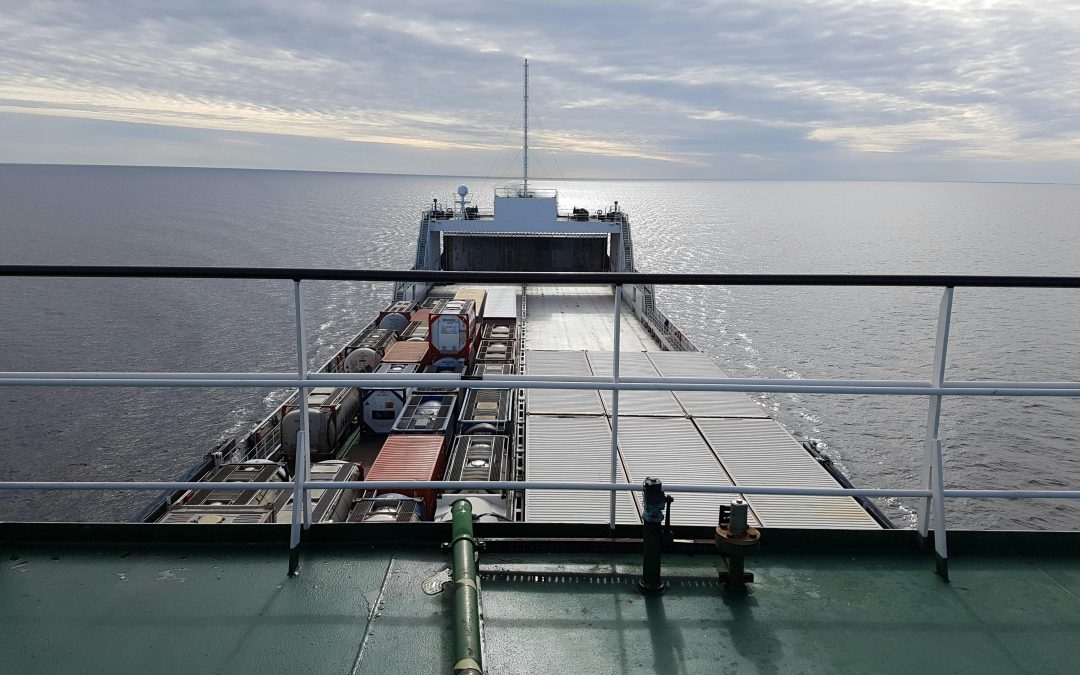The UN’s International Maritime Organization (IMO) is entering the final stage of negotiations on a carbon price on international shipping–the world’s first global pricing of emissions on any sector–at the 83rd session of the Marine Environment Protection Committee (MEPC 83) meeting in London next week.
This follows a round of technical discussions this week, where countries moved forward with a single policy framework that encompasses both technical (fuel standard) and economic (carbon pricing) elements.
Depending on the level of ambition agreed at the MEPC, this policy could effectively cover and price all emissions from ships, e.g. as a universal levy, and generate stable and predictable revenues for a just and equitable energy transition.
On Monday, 7 April, IMO delegates from high-ambitious countries will hold a press conference and a Q&A at 1:30-2pm at the IMO HQ, SGs conference room (following SG’s press conference at 1pm).
Acclaimed climate campaigners Mikaela Loach and Tori Tsui will also be in attendance at the IMO next week. Please reach out if you want interviews.
Ambassador Albon Ishoda, Marshall Islands Special Envoy for Maritime Decarbonization, said: “The universal levy remains on the table — and that’s essential. A growing bloc of countries, particularly from Africa, the Caribbean, Central America, and the Pacific, is united in its focus on delivering ambition and equity for the Global South. But when it comes to equity, our voices continue to be ignored. I have real concerns that the package being shaped may not be one that truly protects the most vulnerable or ensures no one is left behind.”
Aurelia Leeuw, Director of EU Policy at the SASHA Coalition, said: “To secure a just and equitable transition for all, the EU must push for ambitious IMO regulations: a high-rate levy and robust fuel standards. The measures decided at the IMO this week will not only determine the future of marine fuels but could jumpstart the EU’s Clean Industrial Deal competitiveness goals in maritime and beyond. LNG and biofuels are neither economically nor environmentally sustainable, while green hydrogen e-fuels present the only credible path to net zero shipping and guarantee its future stability. The EU is already a frontrunner in this burgeoning market, and ambitious regulations could de-risk its e-fuel production, unlocking investment at scale.”
Bastien Bonnet-Cantalloube, Expert on Decarbonisation of Aviation and Shipping, at Carbon Market Watch, said: “While nations strive for fair and equitable shipping emissions cuts, IMO talks risk going nowhere. Governments must step up to ensure all GHG emissions are priced, as there is a need to refocus efforts on the levy championed by the majority. The EU’s failure to defend and uphold fair and effective carbon pricing is a glaring weakness, undermining global climate action. As the climate crisis rages on, key decisions on emission pricing and credit rules for the shipping sector loom large. All efforts must be mobilised to ensure meaningful carbon pricing is part of the final compromise.”
Emma Fenton, Senior Director, Climate Diplomacy, Opportunity Green, said: “At the close of the ISWG meeting it is vital for delegates to remain focused on achieving the high level of ambition that was first proposed by the Pacific nations in their calls for a strong, flat rate levy to ensure effective decarbonisation and a just and equitable transition. Now more than ever, developed countries must stand in solidarity with the calls from climate vulnerable countries and agree measures that will achieve this essential outcome.”
Jamie Yates, Climate and Renewable Energy Analyst, Pacific Environment, said: “Pacific Environment continues to call for a robust levy framework as championed by Pacific, African, and Caribbean nations, paired with a stringent fuel standard. It is critical for the IMO to adopt a measure that will close the cost gap between fossil fuels and truly sustainable fuels and set the sector on the path for a transition that is just and equitable for all. We are watching for potential loopholes, such as the exclusion of certain emissions or trade routes, that would weaken the measure and leave climate vulnerable and developing countries without a lifeline against the effects of climate change.”
Countries met for formal working group talks (ISWG-GHG-18) on 31 March and 1 April, and then continued in an informal setting led by Singapore starting on 2 April.
At the informal negotiations, countries are discussing:
The definition of zero-/near-zero-emission energy: a grouping of African, Caribbean, and Pacific countries are asking to limit rewards exclusively to wind propulsion, onboard solar energy and e-fuels, excluding biomass feedstock.
Distribution of revenues generated by emissions pricing, especially regarding the definition of “in-sector” and “out-sector” investments.
The importance of addressing food security and nutrition within the framework, with the majority of countries in agreement on this issue.
At the technical working group talks (ISWG-GHG-18) on 31 March – 1 April, this happened:
Pacific, Latin American, Caribbean and African countries, with the support of the UK, continued to push for a levy within the new architecture of a single policy. The Pacific Island states set a red line for the option to make all ships pay to emit any greenhouse gases.
China and India have indicated openness to the need for stable revenues, suggesting amendments to the GFS that would stabilise revenue generation. Their position has now surpassed the ambition of the EU on the fundamental policy design.
The EU was weak in not standing by its own proposal for a $100 levy (capable of generating up to $60 billion dollars a year) by supporting a weak architecture of the future mechanism, aiming to generate only $30 billion dollars a year. There are serious concerns in the room that even this level of revenue would not be reached.
The IMO promised to adopt an economic measure/carbon price as a way to deliver its agreed emission cuts in an equitable way (the 2023 Revised Strategy): 30% by 2030, 80% by 2040, to reach zero by 2050.
Carbon pricing would help close the price gap between fossil fuels and renewable energy, and generate revenues for an equitable transition. A study by UNCTAD, commissioned by the IMO, found that a levy of $150-300/tonne of greenhouse gas, if designed correctly, is the best way to minimise the economic impacts of shipping decarbonisation on global GDP growth, and to promote global economic equality.
Sources: Clean Shipping Coalition, Pacific Environment, Opportunity Green





